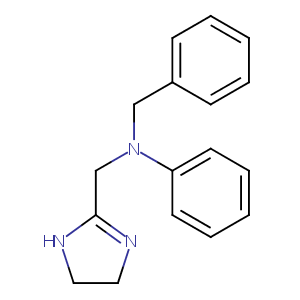Drug Information
| Drug General Information | Top | |||
|---|---|---|---|---|
| Drug ID |
D06FZX
|
|||
| Former ID |
DAP001347
|
|||
| Drug Name |
Antazoline
|
|||
| Synonyms |
Analergine; Antastan; Antasten; Antazolin; Antazolina; Antazolinum; Antihistal; Antistin; Antistine; Azalone; Histostab;Imidamin; Imidamine; Phenazolin; Phenazoline; Antazolina [Spanish]; Antazolinum [Latin]; Antazolina [INN-Spanish]; Antazoline (INN); Antazoline [INN:BAN]; Antazolinum [INN-Latin]; Ben-A-hist; N-Benzyl-N-(4,5-dihydro-1H-imidazol-2-ylmethyl)aniline; N-(4,5-dihydro-1H-imidazol-2-ylmethyl)-N-(phenylmethyl)aniline; 2-(N-Benzylanilinomethyl)-2-imidazoline; 2-(N-Phenyl-N-benzylaminomethyl)imidazoline; 2-Phenyl-benzyl-amino-methylimidazolin; 2-Phenyl-benzyl-amino-methylimidazolin [German]; 4,5-Dihydro-N-phenyl-N-phenylmethyl-1H-imidazole-2-methanamine; 5512-M
Click to Show/Hide
|
|||
| Drug Type |
Small molecular drug
|
|||
| Indication | Nasal congestion [ICD-11: MD11.9; ICD-9: 478.19] | Approved | [1], [2] | |
| Structure |
 |
Download2D MOL |
||
| Formula |
C17H19N3
|
|||
| Canonical SMILES |
C1CN=C(N1)CN(CC2=CC=CC=C2)C3=CC=CC=C3
|
|||
| InChI |
1S/C17H19N3/c1-3-7-15(8-4-1)13-20(14-17-18-11-12-19-17)16-9-5-2-6-10-16/h1-10H,11-14H2,(H,18,19)
|
|||
| InChIKey |
REYFJDPCWQRWAA-UHFFFAOYSA-N
|
|||
| CAS Number |
CAS 91-75-8
|
|||
| PubChem Compound ID | ||||
| PubChem Substance ID |
5141625, 7978713, 8151493, 10537839, 11112519, 11113348, 11335258, 11360497, 11363683, 11366245, 11368807, 11371466, 11373721, 11376969, 11461469, 11466286, 11467406, 11484934, 11486031, 11489075, 11490119, 11491956, 11494603, 15070645, 29221378, 47365022, 47440086, 47440087, 47810597, 47885255, 47885256, 48259060, 48415573, 49698409, 49980605, 50100471, 50100472, 50265613, 51091789, 56366164, 57321196, 85083863, 85209552, 85788777, 85789405, 99445269, 103404110, 104299901, 118269282, 123120968
|
|||
| ChEBI ID |
CHEBI:84115
|
|||
| SuperDrug ATC ID |
R01AC04; R06AX05
|
|||
| SuperDrug CAS ID |
cas=000091758
|
|||
| Target and Pathway | Top | |||
|---|---|---|---|---|
| Target(s) | Histamine H1 receptor (H1R) | Target Info | Antagonist | [3], [4], [5], [6] |
| KEGG Pathway | Calcium signaling pathway | |||
| Neuroactive ligand-receptor interaction | ||||
| Inflammatory mediator regulation of TRP channels | ||||
| Panther Pathway | Histamine H1 receptor mediated signaling pathway | |||
| Reactome | Histamine receptors | |||
| G alpha (q) signalling events | ||||
| WikiPathways | Monoamine GPCRs | |||
| GPCRs, Class A Rhodopsin-like | ||||
| IL-4 Signaling Pathway | ||||
| Gastrin-CREB signalling pathway via PKC and MAPK | ||||
| GPCR ligand binding | ||||
| GPCR downstream signaling | ||||
| References | Top | |||
|---|---|---|---|---|
| REF 1 | URL: http://www.guidetopharmacology.org Nucleic Acids Res. 2015 Oct 12. pii: gkv1037. The IUPHAR/BPS Guide to PHARMACOLOGY in 2016: towards curated quantitative interactions between 1300 protein targets and 6000 ligands. (Ligand id: 7116). | |||
| REF 2 | FDA Approved Drug Products from FDA Official Website. 2009. Application Number: (NDA) 018746. | |||
| REF 3 | Histamine and the convulsive threshold or effectiveness of antiepileptic drugs. Przegl Lek. 2008;65(11):803-6. | |||
| REF 4 | Influence of antazoline and ketotifen on the anticonvulsant activity of conventional antiepileptics against maximal electroshock in mice. Eur Neuropsychopharmacol. 2004 Aug;14(4):307-18. | |||
| REF 5 | A current appreciation of sites for pharmacological intervention in allergic conjunctivitis: effects of new topical ocular drugs. Acta Ophthalmol Scand Suppl. 1999;(228):33-7. | |||
| REF 6 | Nonsedating histamine H1-receptor antagonists. Clin Pharm. 1989 May;8(5):331-44. | |||
If You Find Any Error in Data or Bug in Web Service, Please Kindly Report It to Dr. Zhou and Dr. Zhang.

